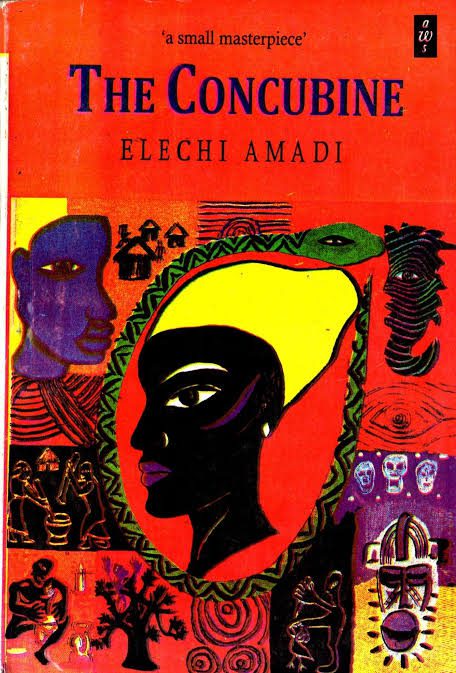Some of the dominant themes in Elechi Amadi’s The Concubine include the themes of love and jealousy, inevitable fate, superstition and tradition, illusory reality, and destructive beauty.
Theme of Love and Jealousy
Love and jealousy permeate the pages of Elechi Amadi‘s novel, The Concubine, resonating from both human and divine perspectives. The protagonist, Ihuoma, exhibits her profound love for her late husband, Emenike, through her unwavering devotion, as she meticulously fulfills her duties and rituals in his memory.
However, it is in her relationship with Ekwueme that we witness a love that is pure and passionate, transcending conventional boundaries.
Although Ekwueme’s yearning for Ihuoma may appear more desperate, her affection for him burns with equal intensity, especially evident during his bout of madness, where she remains steadfastly by his side, devoid of any repulsion.
Meanwhile, at the human level, jealousy manifests through the actions of Madume, whose bitter animosity towards Emenike stems from both territorial and amorous rivalry. Ihuoma’s choice to marry Emenike leaves Madume embittered, fueling his jealousy further.
Furthermore, love and jealousy find expression in the supernatural realm through the Sea-King, who is Ihuoma’s true husband in the spirit world.
The Sea-King’s profound affection for Ihuoma, his cherished wife, transforms him into an invisible and formidable adversary to all earthly and mortal contenders. Possessive love characterizes the Sea-King’s affections, inevitably giving rise to jealousy.
One intriguing aspect of the narrative is the Sea-King’s deliberate delay in dealing with Emenike, waiting for six long years and three children to pass. This begs the question of whether his motives extend beyond merely appeasing the doomed husband, possibly indicating his intentions towards the children. The cunning employment of Nwonna to destroy Ekwueme certainly suggests such a trajectory.
Theme of Inevitable Fate
In Elechi Amadi’s The Concubine, an ever-present sense of peril lingers, suggesting that certain events are bound to unfold. The novel is emphatic about the inevitability of fate.
Emenike, Madume, Ekwueme, and even Ihuoma herself emerge as victims of an inexorable fate, controlled by supernatural forces beyond their immediate grasp. Emenike and Madume, unaware of Ihuoma’s otherworldly nature, seem to have acted out of ignorance. However, Ekwueme, despite receiving warnings about his Sea-King adversary, displays a willingness to defy the wrath of four hundred Sea-Kings for the sake of his love.
This reveals that even possessing knowledge of his impending doom is insufficient to alter his tragic course. As the saying goes, a hunting dog destined to lose its way in the forest will ignore the whistle of its master-hunter. Ekwueme is resolute in his determination to marry Ihuoma, regardless of the calamity that may befall them. He boldly declares to his father:
“One thing is clear: I shall marry Ihuoma. She is a human being, and if marrying a woman like her is a fatal mistake, I am prepared to make it. Even if I am her husband for just one day before my demise, my soul will depart singing joyfully to the spirit world.”
The Concubine
Ironically, he is denied even a single day as her lawful husband, as he meets a tragic fate on the eve of their wedding. Like those who came before him, his destiny is sealed, while Ihuoma herself remains little more than a mere instrument in the hands of fate.
Theme of Superstition and Tradition
Elechi Amadi’s The Concubine delves into the traditional beliefs and superstitions prevalent in African society, particularly surrounding the concepts of incarnation and reincarnation. These beliefs provide an explanation for the journey of the human soul before and after death.
According to these beliefs, various entities, including spirits and animals, can assume human forms through the process of incarnation and interact with ordinary humans. Even individuals who die prematurely are thought to have the ability to complete their earthly existence elsewhere before transitioning to the spirit world. Similarly, it is believed that old individuals can be reborn as newborn babies, while certain babies may traverse between the realms of the living and the dead.
However, the central belief in the novel revolves around the possibility of sea spirits seeking human companionship to incarnate and mingle with regular people. Ihuoma, the protagonist, embodies this concept. As Anyika explains:
“There are few women like that in the world. It is death to marry them, and they leave behind a harrowing string of dead husbands. They are usually beautiful, very beautiful, but dogged by their invisible husbands of the spirit world. With some spirits, marriage is possible if an expert on sorcery is consulted. With the Sea-King, it is impossible…”
The Concubine
Whether this belief is mere superstition or rooted in truth depends on the evidence presented within the narrative rather than the reader’s personal beliefs. Some characters who may initially be skeptical are likely to reconsider their stance after witnessing the tragic fate of Ekwueme.
The novel also portrays other aspects of African traditions, particularly those pertaining to burial and marriage. These customs are specifically exemplified through Emenike’s second burial and Ahurole’s marriage to Ekwueme.
Theme of Illusory Reality
The theme of illusory reality manifests in the enigmatic character of Ihuoma, the novel’s heroine. On the surface, she possesses beauty, grace, dignity, and honor, seemingly embodying all that is desirable. However, beneath this facade lies the essence of danger and premature death.
Tragically, Ihuoma remains oblivious to the truth of her supernatural origins, unknowingly inflicting suffering and death upon all who love her.
When confronted with the revelations of divination regarding her true nature, she responds with ignorant disbelief, remarking,
“These things are strange and almost funny. I certainly don’t feel like a daughter of the sea.”
The Concubine
This lack of awareness renders her even more perilous than a witch who wields her powers knowingly, capable of choosing to spare or kill. In Ihuoma’s case, she remains largely ignorant of her own existence, presenting a stark contrast between her perceived image and her true reality.
Theme of Destructive Beauty
The theme of destructive beauty weaves a captivating thread throughout the novel. Ihuoma, the central character, possesses not only physical beauty but also an embodiment of perfection, accompanied by impeccable manners.
In the flawed world depicted in the novel, Ihuoma stands as an epitome of human perfection, almost too good to be real. Anyika astutely remarks to Ekwueme’s puzzled parents after his divination:
“Look at her, have you seen anyone quite so right in everything, almost perfect? I tell you only a sea-goddess—for that is precisely what she is—can be all that.”
The Concubine
However, Ihuoma’s beauty is not without its dangers. She becomes a perilous beauty, a woman whose enchanting allure poses a grave threat to any man ensnared by her, as it ultimately leads to his demise.
Her beauty serves as a trap for unsuspecting men, and she herself is acutely aware of the predicament her beauty brings, stating twice in the novel, “Beauty seems to carry sorrow with it” and “beauty does not always mean happiness. I have not been a very happy woman.” Those who fall under her spell come to realize this truth all too well.
Further Reading:
 WHATSAPP: Click HERE to join the new Literature PADI WhatsApp group to receive latest updates on your phone and for further literary discussions!
WHATSAPP: Click HERE to join the new Literature PADI WhatsApp group to receive latest updates on your phone and for further literary discussions!









